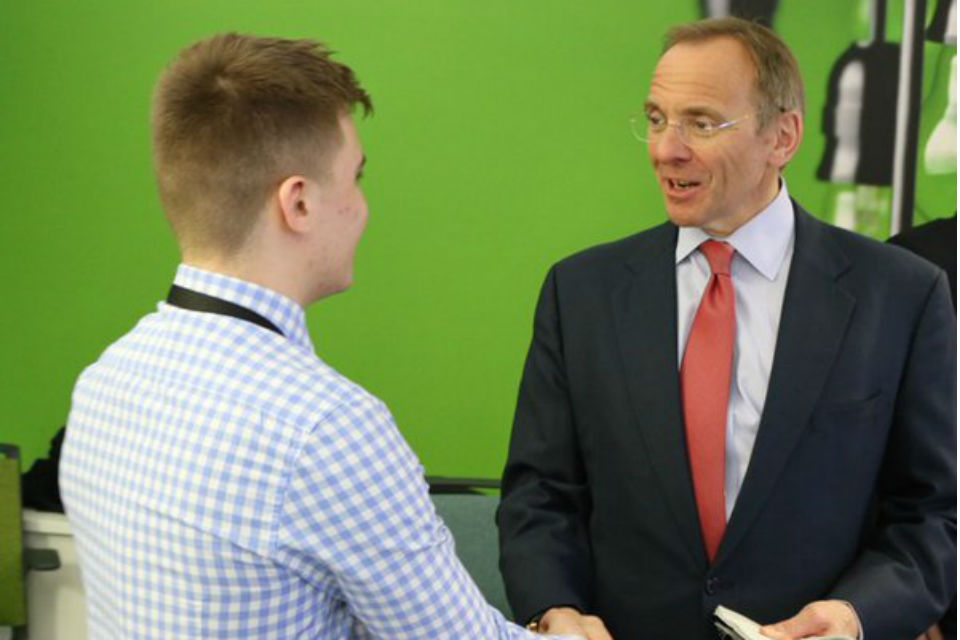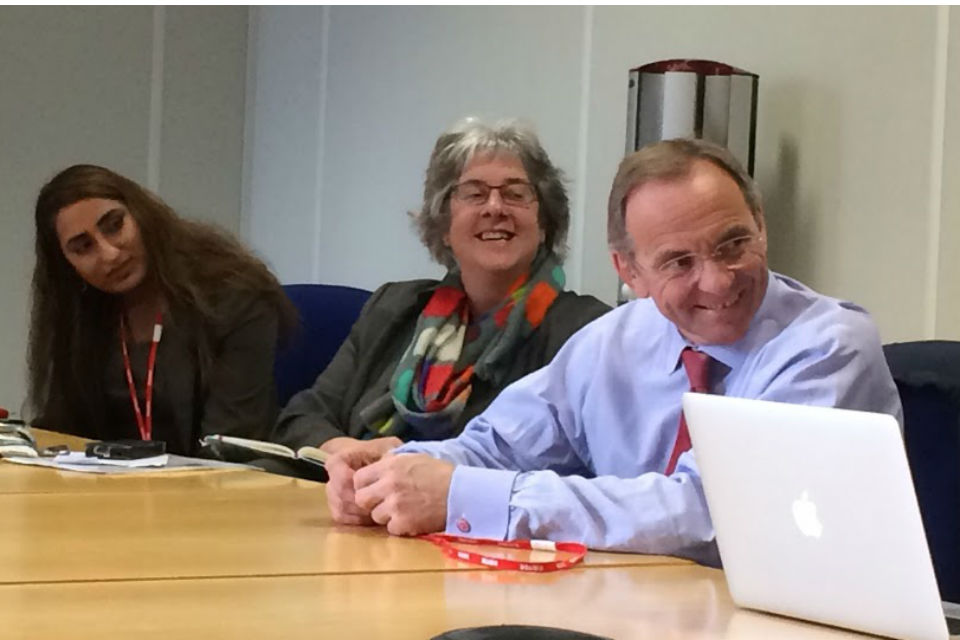
Visiting civil servants around the country is giving me a real appreciation of how we can – and are – making government better for the people it serves and the people who work within it.
Anyone who has followed this blog over the last year or so, will know I believe the future of the Civil Service has to be more collaborative than the past, and that we need to build services around the needs of the citizen wherever possible. On a recent trip to Nottingham I saw an example of this vision being put into practice through the Government’s Estate Strategy, supported by the Government Property Unit (GPU).
Government hub
Working with departments and other stakeholders, GPU has already reduced the size of the government estate by nearly 25% and raised £1.8 billion in capital receipts since 2010, while saving £842 million in running costs in 2014/15. But the Estate Strategy isn’t just about savings, it’s about introducing more efficient, collaborative ways of working.
In Nottingham, the government hub for the East Midlands, I saw example after practical example of how we are breaking up inefficient practices, bringing operations together under one roof, pooling resources, and multiple departmental teams working as one to streamline public services without compromising their quality.
Ambitious programme
Starting my day at HMRC’s Castle Meadow campus, I met with colleagues to hear about their plans for a new regional centre in Nottingham by 2021 - part of the “Building our future” programme which will reduce HMRC’s footprint from 170 offices to just 13 of these regional centres. I was hugely impressed by a very ambitious programme of work, which combines meticulous planning to accommodate several hundred more staff, and clear communication explaining the rationale for the move and the benefits it will bring.
Of course, change of this magnitude is difficult – especially as it will mean relocation to a new office for many and, of course, some redundancies. So, it is a testament to the leadership of the team on the ground that they have been able to bring the organisation with them on this journey. The next months and years will require us to do much more of what I call ‘transformational leadership’, so I was delighted to see it so much in evidence at Castle Meadow.

I was also shown round HMRC’s Barkley House premises by a Fast Track Apprentice – a reminder of the importance of introducing new talent into the Civil Service, providing opportunities for the widest possible cross-section of the people we serve, and investing in the future of the organisation.
Holistic experience
My next stop was Nottingham City Council’s HQ, Loxley House, where DWP has also co-located some of its services. The visit highlighted the advantages of a more integrated approach to the delivery of public services, building them around the needs of the citizen. I was particularly struck by how this is creating a more holistic experience of government for the clients of both organisations. The move has also freed up the former DWP building for development, reducing costs for the department and generating income for the council.

Finally, I visited Apex Court, a government hub housing over 15 departments and agencies, and discussed with leaders there the opportunities and challenges that working in a multi-agency setting presents.
What is clear is that the hub not only allows departments to share space and facilities, but also to share knowledge, experience, expertise, best practice, and to put these all at the service of the citizen. Furthermore, having so many departments in one place helps to break down silos, and allows civil servants to build cross-departmental networks and a wider variety of skills and experience to support their careers.
So, while there is a challenge in the huge change going on, it is also an opportunity – an opportunity to demonstrate leadership in introducing new ways of working in new working environments, with modern facilities and equipment, which will help us to develop our people, increase our efficiency and deliver better services.

9 comments
Comment by Lynda posted on
I totally agree with Bill above and have said exactly the same for years.
The Civil Service hasn't worked for years ever since they introduced Caller Centres and remote working environments far away from customers.
I used to work in the old DHSS offices, when the system worked, and any fraud tended to be picked up quite quickly as staff knew their customers.
Why, when major changes are decided, are the staff never asked for their opinion? Why is some big cheese, who probably hasn't been in the dept for 2 mins., given so much power and make such major changes without first consulting the staff for their opinion?
The Civil Service system used to work, where customers could attend their local office, and could either speak Face to Face, on the telephone or via letter to the ONE person who was actually dealing with their case and resolve the problem there and then.
Comment by Elizabeth posted on
Inspiring and well written.
Comment by Rich posted on
John,
Your line: 'Furthermore, having so many departments in one place helps to break down silos, and allows civil servants to build cross-departmental networks and a wider variety of skills and experience to support their careers.'...
This sounds awfully like the Government Office network which was shut down under the Coalition.
Do I detect that the wheel has indeed turned full circle? What is needed is proper evidence driven policy making and decisions and to learn from the past whilst looking to the future.
I'd welcome a commitment to learn from what worked in the past and whilst respecting political decisions building a repository evidencing strong delivery to rebut claims of inefficiency and luxury.
Comment by Paul Bristow posted on
Until the Coalition Government scrapped them, the Government Offices in the Regions served to bring together under one roof officials from different Government Departments located in major regional cities. The decision to scrap these was short-sighted and counter-productive. If "Government hubs" are filling the knowledge vacuum created by scrapping the Government offices, it's about time.
Comment by John Fynaut posted on
I think the problems lie with senior leadership resistance to change, not the staff. I went to a Google Drive update session and when I asked if documents on Google Drive could be shared or even used, the answer was no. If we can’t have Google Drive shared between departments, even for social activities, then I don’t see that civil service leadership have grasped the nettle on joined up government.
Comment by Bill posted on
This future vision of how things should be, all together, working as one team, sounds awfully similar to how Jobcentre used to operate, with local processers just on the other side of the wall from the claimants, and if anything needed sorting quickly it was easily sorted.
Then of course we moved to the central model, where nothing is done locally, but we still encourage claimants to attend their local office to solve problems, who because of the way things are done will send a handover, that has 3 hours to be even looked at, before no doubt firther phone calls to chase progress, and all a mess of a process.
The wheel looks to be turning again. The countdown begins to when we go back again to the central model after moving everyone back in-house.
Comment by Sophie Bolton posted on
Bit disappointed to see that the time you spent with Civil Service Local - an organisation whose sole aim is to bring civil service departments together and encourage collaborative working, is not mentioned here.
Comment by Lol posted on
With due respect, I do not think the lack of collaboration between depts is the problem. 95% of civil service work does not require collaboration between depts anyway. And neither is 'breadth of experience' between depts as beneficial as people say it is (it may even undermine professionalism if it means no one knows gets round to understanding the management of a department in enough detail).
It's changing the mindset of civil servants in their own departments that will change things. It is unrealistic to expect civil servants to be 100% engaged, but it is realistic to be clear that civil servants are expected to perform their duties and just 'get on with it'. A mindset change in this direction (rather than the horizontal collaborative direction) is what will ensure long term efficiency.
Comment by David Lycett posted on
did we not use to have the Government offices where departments collaborated and shared services